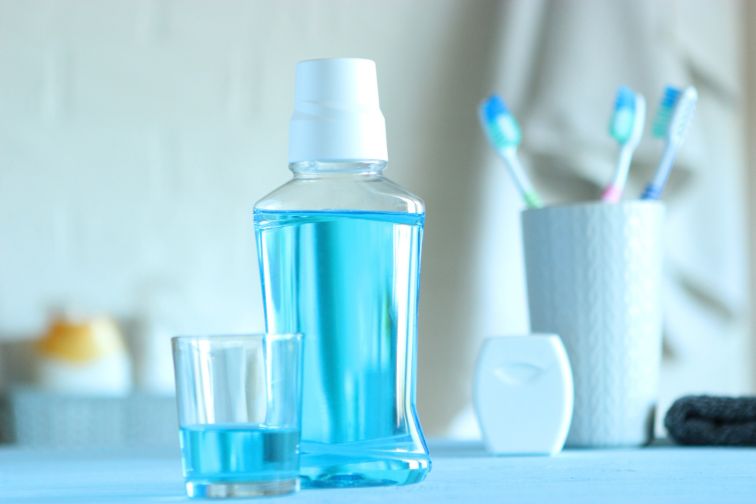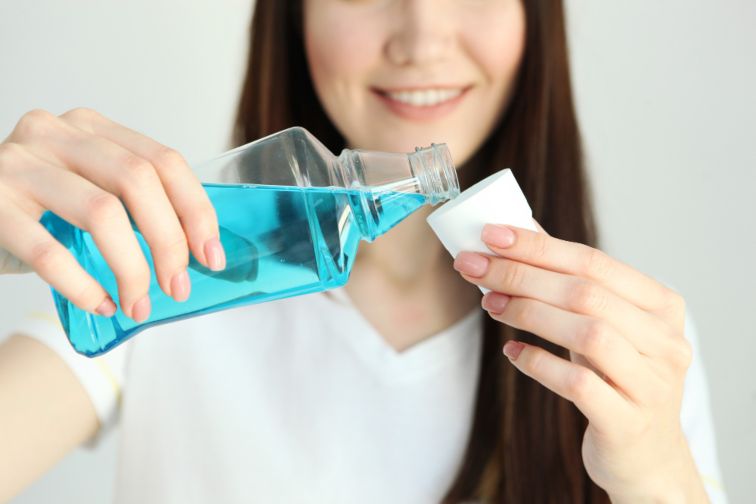When it comes to taking care of our teeth, we’ve certainly all tried mouthwash before, that fresh, minty liquid we rinse our mouth with. But does mouthwash do anything, or is it just a marketing ploy to get you to buy?
Mouthwash usually contains an antiseptic that fights against bacteria that live inside your mouth, on your tongue, or teeth. But not all mouthwash is created equally. There are five different types of mouthwash that are effective at certain things:
Commercial mouthwash is made with a range of ingredients:
This fact is very worrisome to some people, but mouthwash usually contains very little of these chemicals to harm your overall health.
Even though mouthwash helps oral hygiene, it alone can’t replace brushing teeth, flossing and visiting the dentist regularly.

First let’s take a look at the benefits and drawbacks of using mouthwash, and after that everything else you need to know about mouthwash.
All mouthwashes have some kind of fresh smell to them, but this smell can be only temporary. Mouthwashes that contain antimicrobials, for example essential oils, can also kill bacteria that cause bad breath.
Mouthwash can be effective against gingivitis (gum disease) when correctly used in combination with regular brushing and flossing. Mouthwash helps by rinsing away the bacterial particles that stay even after brushing and flossing, and again, mouthwash with antimicrobials is effective in this case.
Mouthwash that contains fluoride is your best bet when dealing with tooth decay and cavities. Fluoride supports remineralization and healthy teeth. Also make sure to brush with toothpaste that contains fluoride, but when brushing and using mouthwash be careful not to swallow them, because consuming too much fluoride can be toxic.
Because of the fact that during pregnancy, women are at higher risk of having gingivitis, using mouthwash can be very beneficial for healthy teeth during pregnancy. Bacterial infections that cause periodontal disease can lead to premature delivery and a greater chance of low birth weight in infants.
Dry mouth (xerostomia) is a medical condition where your salivary glands don’t produce enough saliva to lubricate your tongue and prevent cavities. Most commonly, a mouthwash that contains alcohol can make symptoms of dry mouth even worse.
If you don’t choose the correct type of mouthwash, it won’t do much in terms of fixing your bad breath. Some cosmetic mouthwashes may only give you a freshness boost, rather than help deal with the bacteria that cause bad breath. But mouthwash alone won’t cure your bad breath, be sure to also brush and floss regularly.
Mouthwash with high concentration of alcohol can be used to kill bacteria and germs that live in your mouth, very effectively, but alcohol-based mouthwash can still cause irritations. If you suffer from canker sores or mouth ulcers, mouthwash that contains high concentrations of alcohol can make it even worse.
Alcohol-based mouthwash can, over time, damage the layer of mucus on your teeth, leaving them vulnerable. This can cause great sensitivity.
Mouthwash that contains a chemical called chlorhexidine or bright dyes is more likely to cause teeth staining.

For mouthwash to be fully effective, there are some basic steps you need to take. However, these directions may vary according to which brand of mouthwash you use, so it’s always better to follow the directions on the packaging.
The first step should always be brushing and flossing thoroughly. If you use toothpaste that contains fluoride, you should wait a few minutes before using mouthwash. The mouthwash can negate the positive effects of the fluoride.
You shouldn’t use too much mouthwash when rinsing, only about 3 to 5 teaspoons. There is usually some kind of cup provided with the mouthwash packaging that holds the correct amount you need for rinsing. If the packaging doesn’t come with a cup, you can use a plastic measuring cup and pour the correct amount based on the mouthwash packaging.
Put the mouthwash in your mouth and start swishing it around. While you’re rinsing you should gargle for around 30 seconds, you can set a timer or count in your head. Be sure not to swallow any of the mouthwash, it isn’t meant for ingesting. When the 30 seconds is over, spit the mouthwash out into the sink.
Children younger than 6 shouldn’t use mouthwash, while children between 6 and 12 can use a mouthwash specifically made for children.
You should stop using mouthwash if it gives you ongoing pain and discomfort. In some cases the type of mouthwash that you’re sensitive to can cause breakdown of some of the tissue inside your mouth, leading to mouth ulcers.
Children and pregnant women should avoid using mouthwash with chlorhexidine. Chlorhexidine is given with a prescription, so you should review how to use it thoroughly with your dentist.
You shouldn’t use mouthwash too much because it isn’t essential for good oral hygiene. As said before, you should best use mouthwash after brushing and flossing, in other words, twice a day.
If you feel that your mouthwash is too strong for you, you can dilute it with ordinary water in a 1:1 solution.
If even diluting mouthwash doesn’t help, or you are looking for a more natural mouthwash option you can simply just use saltwater. Saltwater mouthwashes are great temporary replacements, they especially help if you have wounds in your mouth, for instance when you’ve had teeth removed. Salt water is a natural disinfectant and can remove swelling from the tissues. Salt mouthwash is sometimes prescribed, for instance after dental surgery or when dealing with infections or mouth ulcers.
Saltwater isn’t good as a long term solution for mouthwash though, as over time it can lead to tooth erosion that softens your teeth and can lead to an increase in the risk of cavities or tooth chipping.

